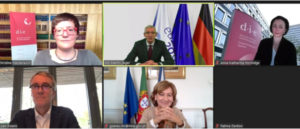
At the end of the German Council Presidency, a public, high-level online panel discussion took place on 14 December 2020 on the subject of „The German Council Presidency and the future of European development policy„. State Secretary Martin Jäger (Federal Ministry for Economic Cooperation and Development, BMZ), Koen Doens (General Director of DG DEVCO), Teresa Ribeiro (State Secretary for Foreign Affairs and Cooperation, Portugal) and Dr. Fatima Denton (Director, UNU Institute for Natural Resources, Ghana) had a lively discussion moderated by Dr. Christine Hackenesch of DIE. Prof. Dr. Anna-Katharina Hornidge (Director DIE) opened the event.
The focus of the discussion was on the successes and challenges of the Council Presidency to find an appropriate global EU response to the Covid-19 pandemic and to ensure coordinated European action. It became clear that the “Team Europe” approach is central to the effective coordination of European development policy in the context of the pandemic. During the upcoming Portuguese presidency, the topics of health, education, green transformation, “working better together” and cooperation with middle-income countries will be important priorities.
Panellists also discussed about the future orientation of European development policy. It became clear that in an increasingly multipolar world order characterized by geopolitical rivalries, international partnerships must be strengthened. For the implementation of the 2030 Agenda and the global sustainability transformation, co-creation of knowledge and policy solutions with partners from the Global South is central. European development policy will thereby need to put more emphasis on future topics such as climate change, digitization and increasing inequality.
Schreibe einen Kommentar